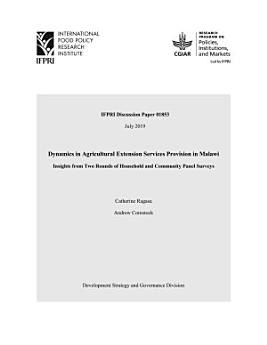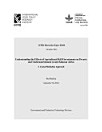Dynamics in agricultural extension services provision in Malawi: Insights from two rounds of household and community panel surveys
Ragasa, Catherine · Comstock, Andrew
aug. 2019 · IFPRI Discussion Paper Cartea 1 · Intl Food Policy Res Inst
Carte electronică
50
Pagini
family_home
Eligibilă
info
reportEvaluările și recenziile nu sunt verificate Află mai multe
Despre această carte electronică
The Government of Malawi is in the process of developing its National Agricultural Extension Strategy. Two rounds of national household and community surveys (2016, 2018), coupled with in-depth interviews and focus group discussions, were implemented to provide research evidence supporting the Strategy’s development. This paper summarizes emerging trends from these surveys and monitors progress in extension services provision, players and actors in extension services provision, and evidence on the coverage and effectiveness of extension approaches. Positive trends include (1) improvements in the percentage of men and women farmers accessing extension services; (2) consistently high ratings in the perceived quality of extension services; (3) more diversity in extension messages, including more information regarding market access and nutrition; (4) greater use of cost-effective tools, such as radio programming and community or group meetings, as sources of agricultural information; and (5) greater crop diversification, although diversification outside of agriculture remains low. Four areas remain weak and need further improvements. First, information sharing among farmers, friends, and neighbors is frequent, and the coverage of those officially trained “lead farmers” (those trained specifically to promote technologies to other farmers) remains low, with only 7 percent of households reporting getting relevant advice from them. Second, while there are more “model villages” and “village agricultural committees” present, we see decreasing participation and ratings for these. Third, we observe greater awareness of promoted technologies, including conservation agriculture, pit planting, and sustainable land practices, but adoption remains very low. Fourth, we observe greater crop diversification, but farm productivity and commercialization remain low. Although we have investigated many dimensions and factors in this paper, there remain challenges and puzzles that could be further addressed in future research. These include constraints on the adoption of minimal expensive inputs and low-cost management practices, constraints on the role of intensive training and labor, and understanding the drivers and factors affecting commercialization and diversification.
Evaluează cartea electronică
Spune-ne ce crezi.
Informații despre lectură
Smartphone-uri și tablete
Instalează aplicația Cărți Google Play pentru Android și iPad/iPhone. Se sincronizează automat cu contul tău și poți să citești online sau offline de oriunde te afli.
Laptopuri și computere
Poți să asculți cărțile audio achiziționate pe Google Play folosind browserul web al computerului.
Dispozitive eReader și alte dispozitive
Ca să citești pe dispozitive pentru citit cărți electronice, cum ar fi eReaderul Kobo, trebuie să descarci un fișier și să îl transferi pe dispozitiv. Urmează instrucțiunile detaliate din Centrul de ajutor pentru a transfera fișiere pe dispozitivele eReader compatibile.











